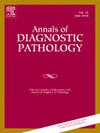mHAI 评分系统在小儿自身免疫性肝炎诊断中的实用性及其与治疗反应的关系
IF 1.5
4区 医学
Q3 PATHOLOGY
引用次数: 0
摘要
自身免疫性肝炎(AIH)是一种慢性炎症性自身免疫疾病,可表现为急性或慢性。以往的评分系统主要针对慢性肝炎,但没有一个系统在急性期儿科患者中得到验证。本研究旨在1)总结儿科 AIH 患者的临床病理特征;2)评估改良肝活动指数(mHAI)是否可用于急性和慢性表现的儿科 AIH;3)评估初始 mHAI 评分与不同终点的治疗反应之间的关联。31名小儿AIH患者被分为急性和慢性两组。使用 mHAI 分级和分期系统对活检进行复查。对 AIH 治疗终点进行了分析:4 周(应答与无应答)、6 个月(完全应答与应答不足)和大约 12 个月(组织学缓解与非缓解)。急性AIH患者的平均mHAI评分更高,界面活动更突出。与反应不充分的患者相比,在6个月时获得完全反应的患者的平均mHAI评分明显更高。值得注意的是,在1年随访中显示纤维化逆转的患者,其最初的mHAI评分往往更高。mHAI 可用于评估小儿 AIH 的急性和慢性表现。急性小儿 AIH 的 mHAI 分值越高,病情活动越严重。mHAI 较高的患者更有可能在 6 个月时对治疗做出完全反应,随后纤维化状况得到改善。本文章由计算机程序翻译,如有差异,请以英文原文为准。
The utility of the mHAI scoring system in pediatric autoimmune hepatitis diagnosis and its association with treatment response
Autoimmune hepatitis (AIH) is a chronic inflammatory autoimmune disease with either acute or chronic presentation. Previous scoring systems have primarily focused on chronic hepatitis, but none have been validated in an acute setting of pediatric patients. This study aimed to: 1) summarize the clinicopathologic characteristics of pediatric AIH patients; 2) assess if the modified Hepatic Activity Index (mHAI) can be used in both acute and chronic presentations of pediatric AIH; 3) evaluate the association of initial mHAI scores with treatment response at various endpoints. Thirty-one pediatric AIH patients were categorized into acute and chronic presentation groups. Biopsies were reviewed using the mHAI grading and staging system. AIH treatment endpoints were analyzed: 4 weeks (response vs. non-response), 6 months (complete vs. insufficient response), and approximately 12 months (histological remission vs. non-remission). Patients with acute AIH had higher mean mHAI scores and more prominent interface activity. Those achieving complete response at 6 months had significantly higher mean mHAI scores compared to those with an insufficient response. Notably, patients demonstrating fibrosis reversal at the 1-year follow-up often had higher initial mHAI scores. The mHAI can be used to evaluate acute and chronic presentations of pediatric AIH. Acute pediatric AIH has a higher mHAI score with more severe activity. The patients with a higher mHAI have a greater likelihood of achieving a complete response to treatment at 6 months and subsequent improvement in fibrosis status.
求助全文
通过发布文献求助,成功后即可免费获取论文全文。
去求助
来源期刊
CiteScore
3.90
自引率
5.00%
发文量
149
审稿时长
26 days
期刊介绍:
A peer-reviewed journal devoted to the publication of articles dealing with traditional morphologic studies using standard diagnostic techniques and stressing clinicopathological correlations and scientific observation of relevance to the daily practice of pathology. Special features include pathologic-radiologic correlations and pathologic-cytologic correlations.

 求助内容:
求助内容: 应助结果提醒方式:
应助结果提醒方式:


